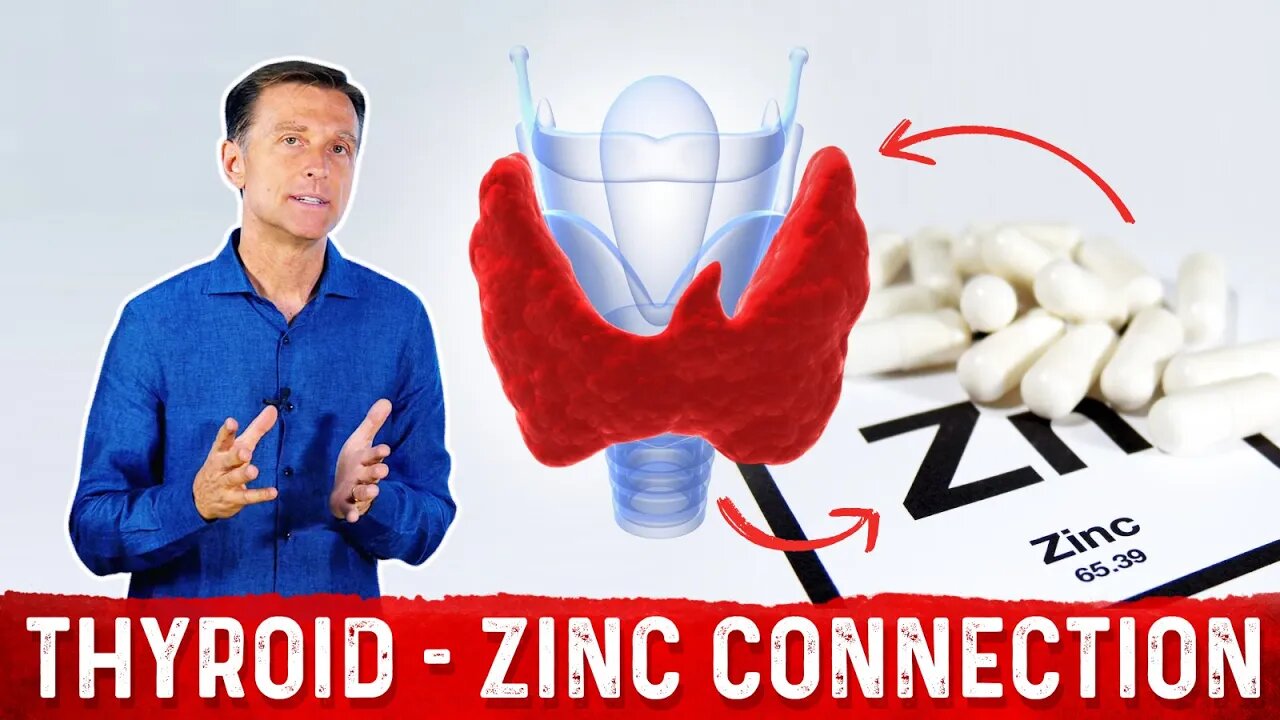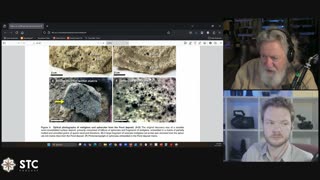Premium Only Content

Subclinical Hypothyroidism and Zinc Deficiency – Dr.Berg
There is a really important missing factor in subclinical hypothyroidism— a zinc deficiency. Check this out.
Timestamps
0:08 What is subclinical hypothyroidism?
0:27 Trace minerals involved in thyroid function
0:47 The thyroid and zinc connection
1:25 Can having a slow thyroid cause a zinc deficiency?
1:38 What to do
Today we’re going to talk about subclinical hypothyroidism and a zinc deficiency.
Subclinical hypothyroidism is a situation where you have a slow thyroid, but the blood values are still normal. If you’re looking at blood tests alone, you can completely miss this condition.
There are several important trace minerals involved in thyroid function, such as:
• Iodine
• Selenium
• Copper
• Zinc
Zinc is not emphasized enough. Zinc is not only involved in the conversion from T4 to T3 but, it’s also involved in the synthesis of T4 and T3, as well as the thyroid-stimulating hormone. Without enough zinc, you can’t convert these hormones, and you can’t make thyroid hormones.
Once you have a hypothyroid condition, you’re going to have a hard time absorbing zinc. Having a slow thyroid may actually cause a zinc deficiency.
If you have any thyroid symptoms, don’t forget about zinc. One great way to get more zinc is to consume more shellfish, sea kelp, or take a supplement.
Talk to a Product Advisor to find the best product for you!
Call 1-540-299-1556 with your questions about Dr. Berg's products. Product Advisors are available Monday through Friday 8am-6pm and Saturday 9am-5pm EST.
* At this time, we no longer offer Keto Consulting and our Product Advisors will only be advising on which product is best for you and advise on how to take them.
Dr. Eric Berg DC Bio:
Dr. Berg, 56 years of age is a chiropractor who specializes in Healthy Ketosis & Intermittent Fasting. He is the author of The New Body Type Guide and other books published by KB Publishing. He has taught students nutrition as an adjunct professor at Howard University. He no longer practices, but focuses on health education through social media.
Follow us on FACEBOOK: fb.me/DrEricBerg
Send a Message to his team: m.me/DrEricBerg
ABOUT DR. BERG: http://bit.ly/2UDqgnU
Disclaimer:
Dr. Eric Berg received his Doctor of Chiropractic degree from Palmer College of Chiropractic in 1988. His use of “doctor” or “Dr.” in relation to himself solely refers to that degree. Dr. Berg is a licensed chiropractor in Virginia, California, and Louisiana, but he no longer practices chiropractic in any state and does not see patients so he can focus on educating people as a full time activity, yet he maintains an active license. This video is for general informational purposes only. It should not be used to self-diagnose and it is not a substitute for a medical exam, cure, treatment, diagnosis, and prescription or recommendation. It does not create a doctor-patient relationship between Dr. Berg and you. You should not make any change in your health regimen or diet before first consulting a physician and obtaining a medical exam, diagnosis, and recommendation. Always seek the advice of a physician or other qualified health provider with any questions you may have regarding a medical condition.
Thanks for watching! I hope this video helps you better understand how a zinc deficiency may be the missing factor in subclinical hypothyroidism.
-
 3:05
3:05
Dr. Eric Berg
13 days agoWhy Is No One Talking About This?!
8.49K13 -
 8:28
8:28
nospeedlimitgermany
3 days ago $1.18 earnedFord Mustang GT 5.0 V8 421 PS Top Speed Drive German Autobahn No Speed Limit POV
6.99K6 -
 LIVE
LIVE
SilverFox
3 hours ago🔴LIVE - Fox FINALLY plays FORTNITE
45 watching -
 LIVE
LIVE
Fragniac
13 minutes ago🌕 Claire Obscur: EXPEDITION 33 - Act II⚔
33 watching -
 28:39
28:39
The Shannon Joy Show
17 hours ago🔥🔥Are Big Tech ‘Wearables’ Really The Key To Good Health? Dr. Chad Walding Says NO! Special Health Update: (Sponsored By Native Path!)🔥🔥
17.7K6 -
 4:53
4:53
Talk Nerdy Sports - The Ultimate Sports Betting Podcast
2 hours agoHome Run Heat & European Sweep: Saturday's Sharps Only Card
3.76K -
 15:06
15:06
Doc Rich
2 days agoThey Leaked Classified Intel...
18.7K21 -
 LIVE
LIVE
I_Came_With_Fire_Podcast
12 hours agoSoft POWER: "American First" Does NOT Mean "America Alone"
279 watching -
 1:15:25
1:15:25
Wendy Bell Radio
9 hours agoPet Talk With The Pet Doc
34.7K4 -
 2:24:28
2:24:28
Squaring The Circle, A Randall Carlson Podcast
2 hours ago#053 New Discoveries In The Younger Dryas Impact Hypothesis - Squaring the Circle
14.1K3